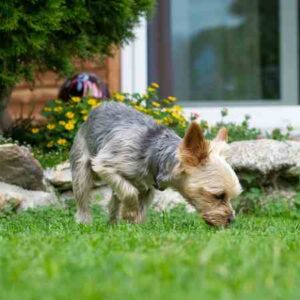Step into the world of Yorkshire Terriers, where adorable fluff meets a bundle of unique behaviour quirks. These pint-sized companions may steal your heart with their irresistible charm, but beneath their cute exterior lie a set of challenges that can leave even the most experienced dog owner scratching their head. In this intriguing journey, we will delve deep into the realm of Yorkie behaviour problems, uncovering the secrets behind their barks, bites, and boundless energy. Get ready to decode the enigma of Yorkie behaviour and discover the keys to a harmonious life with your furry little dynamo.
Separation Anxiety
Yorkies are known for their strong attachment to their owners, which can sometimes lead to separation anxiety. Symptoms of separation anxiety in Yorkies may include excessive barking, destructive behaviour, soiling in the house, and attempts to escape. To alleviate this problem, gradually desensitize your Yorkie to your departures, establish a predictable routine, provide mental stimulation through interactive toys, and consider crate training.
Excessive Barking
Yorkies have a tendency to bark excessively, often alerting their owners to any perceived threats or changes in their environment. While barking is a natural behaviour, excessive barking can become a nuisance. To address this, identify the triggers causing the barking, provide positive reinforcement for calm behaviour, teach the “quiet” command, and engage your Yorkie in regular exercise to release excess energy.
Aggression
Aggression can be displayed by Yorkies due to various reasons, such as fear, possessiveness, or lack of socialization. Signs of aggression may include growling, snapping, or biting. Addressing aggression requires professional assistance from a qualified dog trainer or behaviourist. They can help identify the underlying causes, develop a tailored training plan, and teach techniques to manage and redirect aggressive behaviour.
House Soiling
Yorkies, especially young puppies, may struggle with house training, leading to accidents indoors. Consistency and patience are key when addressing this problem. Establish a regular feeding and potty schedule, provide positive reinforcement for eliminating in the appropriate area, supervise your Yorkie closely, and clean accidents thoroughly to eliminate odours that may attract repeat soiling.
Excessive Chewing
Like many small breeds, Yorkies may resort to excessive chewing, which can be destructive and potentially dangerous if they ingest inappropriate objects. These little dynamos seem to have an insatiable appetite for gnawing on anything within their reach, from shoes to furniture legs. This behaviour can be frustrating and potentially destructive, but it’s important to understand that chewing is a natural instinct for dogs. Yorkies, in particular, have a strong need to keep their jaws busy. As descendants of terriers bred for hunting, their urge to chew helps them exercise their jaws and relieve stress. However, when left unchecked, their penchant for nibbling on your prized possessions can quickly become a problem.
Fearfulness and Shyness
Some Yorkies may exhibit fearfulness or shyness, which can make them anxious or hesitant in new situations or around unfamiliar people. Gentle exposure to new environments, positive reinforcement for confident behaviour, and gradual socialization can help build their confidence and reduce fear-based reactions.
Resource Guarding
Resource guarding refers to a dog’s possessive behaviour over food, toys, or other valuable objects. Yorkies may display this behaviour if they feel their resources are being threatened. Seek professional guidance to address resource guarding effectively. Techniques such as counter-conditioning, desensitization, and teaching the “drop it” command can help modify this behaviour.
Excessive Excitability
Yorkies are known for their high energy levels and can become overly excited, leading to hyperactivity and difficulty in calming down. Regular exercise, structured playtime, and mental stimulation through training or puzzle toys can help manage their excitement and channel their energy in a positive direction.
Understanding Yorkshire Terrier behaviour problems and implementing appropriate training and management techniques can significantly improve the well-being of your Yorkie and enhance your relationship with them. Patience, consistency, and positive reinforcement are essential when addressing these issues. Remember, seeking professional assistance from a qualified dog trainer or behaviourist is always beneficial when dealing with complex behavioural problems. With proper care and attention, you can help your





